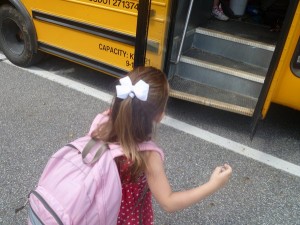A year ago, my daughter waited in the front yard for the bus for her first day of public Pre-K. She wore a bright red dress with white polka dots accessorized with red shoes and a white hair bow. Her brand new pink back pack hid her special lovey. We started waiting early so we couldn’t possibly miss the bus to avoid repeating the family story of my older sister and her first day of school years ago. We stood on that corner in the sun for a long time, my daughter and I both a mix of excitement and anxiety. Finally, a little yellow bus came into view, only to speed past us. My daughter sat on the curb near tears. A minute later, her real bus pulled up, and I had to chase her to give a hug and kiss; otherwise, I worried she’d see me pulling out of view, emerge from her ecstatic haze, and mourn (loudly) her missed goodbye.

The first weeks of school seemed an easy transition, until I talked to her teacher and discovered my daughter was struggling. Guilt washed over me. How could I not know? Why didn’t my daughter tell me? What could I have done differently? Should I have been in better contact with the teacher? With a year of perspective, I see faults in how I prepared for my daughter’s first year of public school.
- Academics were not important. As a high school English teacher, this is hard for me to say, but it remains true that knowing the alphabet or what a rhombus or proboscis were did nothing to make school less stressful, did nothing to make my daughter happy or safe or comfortable. Pre-K and Kindergarten are the first steps in the journey of formal schooling, and as such the point is to lay the foundation of a love of learning. All the deficiencies, gaps, and failures over the years, and there will be some, will be our work to rectify as a team — parents, teachers, and student. The whole point is to learn on the way, not to start ahead.
- We needed to talk more about how school was exciting and fun, especially in comparison to explaining routines and rules or preempting fears. What makes me feel comfortable in a new situation as an adult, is not what my daughter needed and I unintentionally projected some of my anxiety on to her. Instead, I wish we seized more opportunities to excite her about new learning, new experiences, and new friends while explaining how she would share favorite things from her everyday life.
- I needed to advocate better for my family. The school made me wait and wait to get information. That’s unacceptable. I should have met with the principal privately to have my questions answered, tour of the school, and even observe a class. While common practice for private preschools, I worried about being a nuisance. But, the school serves my family, not just my daughter; I deserved to feel comfortable about sending my child without concern for the school’s convenience or perception of me.
- My daughter needed more familiarity with the setting, including the people. My son has a huge advantage over his sister; he’s already mastered the playground equipment and visited inside the school many times. While we visited the play ground frequently, my daughter had to wait until open house to step inside the school, meet her teacher, see her classroom, and check out a bus. If I could do it again, I would requested visits inside the building over the summer to demystify the building and staff.
- We needed to create more confidence in her independence. Too often we commented on how mistakes would be a problem at school instead of explaining how her accomplishments would help her succeed. Again, my stress about her shortcomings being troublesome created anxiety. Early education teachers have seen and dealt with it all before! When its time to prepare my son, we will focus on his successes and discuss his mistakes only in terms of how to ask for help.
- I needed to be more involved with the school. I was involved with my daughter: Listening about her day, helping with the occasional homework, keeping her classmates name’s straight, going to every school event. Involvement with the school — the teacher, the class, the school community, the policy makers — was missing. This included everything from emailing her teacher regularly to discussing education reform with the administrators to sitting through those boring PTO and school committee meetings. I needed to be more informed, and if the school wouldn’t forward information to me, I needed to be proactive about collecting it and speaking up when I disagreed.
A month into the year, my daughter’s teachers recognized her growth during their first awards assembly.

And her first trimester teacher conference was very positive. I allowed myself to release any guilt about the transition to school. I had not ruined by daughter’s school career, nor had I caused any emotional scars. Furthermore, I could never be certain that any improvements I envisioned would have actually made a difference. But I have allowed my experiences to inform by decisions this summer as we’ve prepped for Kindergarten. Come August 27th, my daughter and I will both be waiting for the bus with a lot more excitement and much less anxiety.
